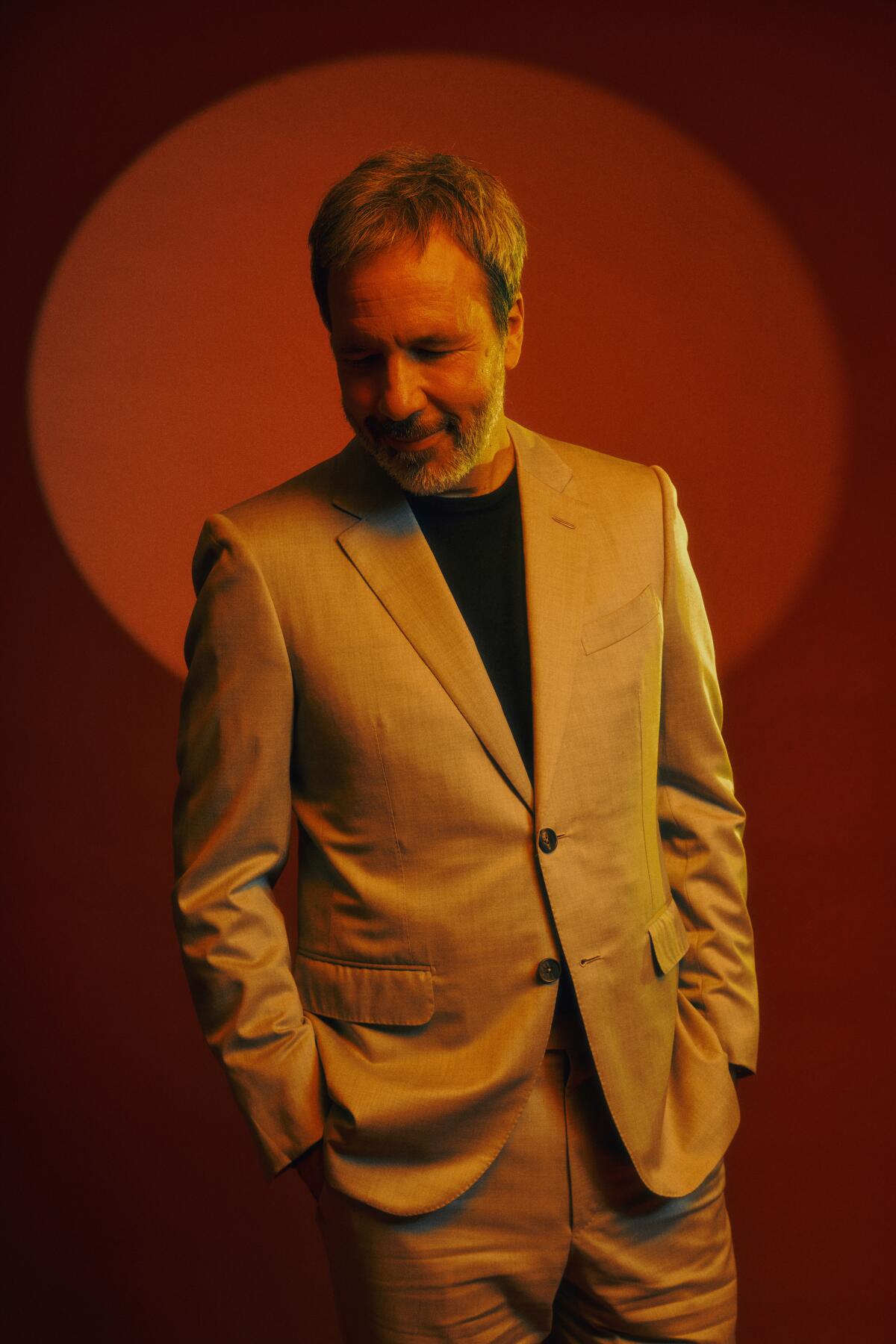You can’t beat a babka! Although, yes, Emily Alben is correct, writing in our food section, that it should be a chocolate babka. Making (or ordering) a (lesser) cinnamon babka can only lead to disaster.
Newsletter
From the Oscars to the Emmys.
Get the Envelope newsletter for exclusive awards season coverage, behind-the-scenes stories from the Envelope podcast and columnist Glenn Whipp’s must-read analysis.
You may occasionally receive promotional content from the Los Angeles Times.
I’m Glenn Whipp, columnist for the Los Angeles Times and host of The Envelope’s Friday newsletter. It’s the last time I’ll be in your inbox in 2024. Hope you have a happy new year, no matter how you’re toasting.
Denis Villeneuve isn’t at peace. And he’s OK with that
Denis Villeneuve just ordered a short espresso, enough to reinvigorate his mind but not interfere with the nap he wants to take in a couple of hours. Looking around the restaurant patio at the Chateau Marmont, populated by folks famous and fame-adjacent, some whispering, others talking at a volume that seems less an invitation than a demand to eavesdrop, the filmmaker shakes his head and smiles.
“I always feel like I’m in Sofia Coppola’s territory when I come here,” he says, referring to Coppola’s 2010 movie “Somewhere,” set at the legendary Sunset Boulevard hotel.
Villeneuve is in L.A. to shake some hands and remind voters about his movie, “Dune: Part Two,” which came out nearly nine months ago, an eternity in the awards season timeline. The first “Dune” earned 10 Oscar nominations in 2022, winning six. Villeneuve picked up nods for writing and producing the best picture nominee but not for directing. He has been nominated as a director only for the 2016 sci-fi drama “Arrival,” a level of recognition that feels a little light.
We hadn’t spoken in more than 13 years, not since his 2010 political drama “Incendies” put him on the map as a filmmaker to watch, earning an Oscar nomination for international feature film. But we picked right up, talking about psychedelics, the conflict between wanting to work and simply being still and watching a tree grow and the one on-set policy he shares with Christopher Nolan. I really enjoyed our time together and hope it’s not another 13 years before we speak again. You can read the conversation here.

“Dune: Part 2 filmmaker Denis Villeneuve.
(Ethan Benavidez/For The Times)
Will directors branch voters continue to look across the globe?
Any group that wants to recognize the work of the women behind two of the year’s best movies — the poignant poetry of Payal Kapadia’s “All We Imagine as Light” and the bruising body horror in Coralie Fargeat’s “The Substance” — is OK with me, even if that group is the Golden Globes, an organization that seems to exist solely for the profit of its corporate owners.
The Globes remain a brand, even if that brand has been tarnished and rehabilitated more times than my grandmother’s silverware. They’re still televised, returning this year to CBS, and last year about 10 million people watched the ceremony.
For their director prize, Globes voters nominated Fargeat and Kapadia, along with Sean Baker (“Anora”), Edward Berger (“Conclave”), Jacques Audiard (“Emilia Pérez”) and Brady Corbet (“The Brutalist”). For fans of “All We Imagine as Light” and particularly “The Substance,” which has developed a fervent following since its September release, the Globes nominations sparked hope that Kapadia and Fargeat might be among the directors celebrated at the Oscars this year.
The academy’s directors branch might be the most adventurous group of Oscar voters. Its membership boasts a large number of international filmmakers, a demographic that has played a part in nominating directors behind non-English-language movies for several years running. Justine Triet (“Anatomy of a Fall”) and Jonathan Glazer (“The Zone of Interest”) were feted at the last Oscars, following the likes of Ruben Östlund (“Triangle of Sadness”), Ryusuke Hamaguchi (“Drive My Car”), Thomas Vinterberg (“Another Round”) and Bong Joon Ho, who won for “Parasite,” which also became the first non-English-language film to win the Oscar for best picture.
That history should be good news for Kapadia — except all of those previous international filmmakers’ movies were Oscar-nominated either for best picture or international feature, or both. India did not submit “All We Imagine as Light” for international feature, a decision that was criticized at the time and ultimately backfired when the movie it did submit, “Laapataa Ladies,” failed to make the Oscars’ international feature shortlist. “All We Imagine as Light” could still earn a best picture nomination, but the movie and its director may well have to be content with the numerous critics group prizes that have come their way.
Fargeat has become a popular pick of late with awards season pundits. But they may be giving too much weight to the Globes nomination, as well as the prizes that she and “The Substance” have been picking up from regional critics groups. The European Film Awards didn’t nominate Fargeat for director, a notable miss from a body that has been a key indicator of success with the film academy. “The Substance” did pull in a leading number of nominations, winning two. Maybe she was a near-miss for a nod?
Three directors seem locked in at the moment for Oscar nominations — Baker, Audiard and Corbet. Might Villeneuve join them? What about Jon M. Chu for “Wicked” or RaMell Ross, acclaimed for bringing “Nickel Boys” to the screen? I assessed their chances in a recent column. We’ll have a bit more clarity when the Directors Guild announces nominees for the DGA Awards on Jan. 8.

Clockwise from top left: Edward Berger, Coralie Fargeat, Brady Corbet, Mohammad Rasoulof, Jacques Audiard, Denis Villeneuve, RaMell Ross, Payal Kapadia and Sean Baker (center).
(Illustration by Susana Sanchez; Evan AgostiniInvision / AP; Scott A. GarfittInvision / AP; Vianney Le CaerInvision / AP; Chris PizzelloInvision / AP; Alessandra Tarantino AP)